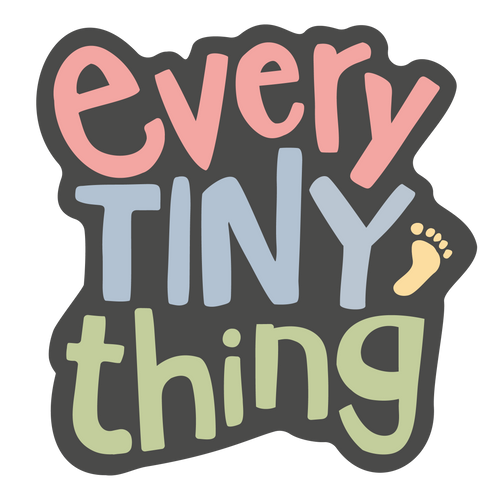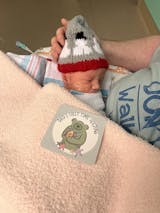Have you heard of Respiratory Syncytial (sin-SISH-Shull) Virus? It’s easier just to call it by its common name, RSV.
Chances are, you’ve probably had RSV before in your life. Actually, many times! And if you have a preemie baby in your life, you’ll need to learn about this important disease. Because preemies are at high risk of becoming very sick from this virus, and the more you know about it, the better you’ll be able to help minimize the risks.
Preemie parents, friends & family all need to be aware of the unique risk that RSV causes for babies who were born prematurely. If you have a preemie, I’d advise you to share this information with anyone who will be interacting with your family and your baby.
AWARENESS
Knowledge about RSV is vital. Here’s what you need to know:
For adults and healthy children, RSV may only produce symptoms of a common cold, such as a stuffy or runny nose, sore throat, mild headache, cough, fever, and a general feeling of being ill. But in premature babies (as well as in kids with diseases that affect the lungs, heart, or immune system), RSV infections can be much more serious.
Preemies are at high risk for two distinct reasons.
Photo Credit: Swedish Orphan Biovitrum
#1 - A preemie’s natural fetal lung development was interrupted, being born with smaller lung capacity and narrower airways. These relatively smaller lungs and airways persist for years, so even a preemie who is now out of the NICU and “healthy” will still have lungs that are especially vulnerable to RSV.
#2 - A preemie didn’t receive the entire transfer of maternal antibodies, which leaves them with an underdeveloped immune system which can also last for years after the NICU.
ONE WAY I FIND THAT MAKES IT EASIER TO UNDERSTAND IS THIS:
RSV is a flu-like virus that most of us get.
In most healthy people it causes cold or flu-like symptoms. No big deal.
But one thing RSV does is that it causes our bodies to make lots of mucous as it fights off the virus. We’ve all had flus that were especially mucous-y, right?
Well, when your airways are a normal diameter, they can be filled with some extra mucous and still manage to get enough oxygen to your body.
But if your airways are especially narrow (ie preemie lungs), and they get filled with all that extra mucous, it becomes incredibly hard to get enough oxygen.
That’s why preemies, even when they’re older, are at such high risk - their airways are smaller, and all that mucous from the RSV infection becomes too much. It can become too hard to breathe and they need support.
This is why a typically healthy individual won’t need hospitalization to get over the illness, but many preemies will.
It’s more complicated than that, but I find that this simple explanation can go a long way for helping people “get it.”
Here’s some additional information that you need to know:
1. RSV is extremely contagious.
RSV can be spread through droplets which contain the virus anytime someone infected with it coughs or sneezes. It also can live for several hours on hands and on other surfaces (such as toys, walls, countertops or phones), so it can be easily spread when a person touches something contaminated.
2. RSV infections often occur during the winter. But not always.
According to the Centers for Disease Control, the US typically sees RSV infections starting in mid-September to mid-November, and the risks remain high through mid-April to mid-May, but it varies from state to state. This is why many preemie families have to isolate themselves from much social contact during winter months. Because it’s so not worth getting your little one so sick with something so dangerous.
3. Parents and other adults can easily infect young children with RSV.
Most people are actually contagious before they realize they are infected with the virus, which means they can easily pass on the infection without realizing it. And when anyone does have symptoms of the illness they remain highly contagious.
4. When preemies get RSV, it’s not uncommon to need hospitalization. And it’s not just when they’re still tiny babies.
After you’ve been through the NICU already, the last thing you want to do is be back in the hospital, am I right? But it’s true, many former preemies who get RSV, even if they’re 1 or 2 or 3 years old, will need to be hospitalized. In the hospital, these children usually need supplemental oxygen, IV fluids, medications to minimize swelling and much more. It’s definitely no fun at all, so it’s absolutely worth doing everything you can to prevent it.
So, it’s a virus that is common, most of us get it, but it’s incredibly important that preemies are protected from it.
So what’s a family to do?
PREVENTION
So, now that you know a little bit about it, what can you do to minimize the chances that your preemie will get RSV?
- Insist that people to first wash their hands before touching your baby. Blame it on the NICU doctors or nurses if you need to, but it’s okay to be extremely firm and insist that hand washing or sanitizing happens every time.
- Avoid kissing your baby in the face. Bummer, I know, but many people are contagious before they feel sick, so every time you give a sweet little kiss on the face you may be sharing a devastating virus with your baby.
- Keep your baby away from crowds. Your neonatologists and pediatricians can help guide you with this, as some babies are at higher risk and need strict isolation through the RSV season. Others just need basic avoidance of crowds.
- Wash toys and the baby’s environment regularly, especially if other children are playing in the same space. Siblings are notorious germ factories.
- If at all possible, limit the time high-risk babies and young children stay in day care, particularly from late fall to early spring when RSV is most prevalent.
- Whenever possible, keep your baby away from anyone with cold symptoms, including siblings.
- If you are able to provide breastmilk to your baby, that can help. Because breast milk contains antibodies and other immune factors that help prevent and fight off illnesses.
- Avoid environments where anyone smokes. Exposure to tobacco smoke can increase the risk of RSV illness.
- It’s highly advisable that your child receives all recommended vaccines. Why? Immunizations won’t prevent your child from getting a cold, but they will protect your child from some of the complications a cold can cause.
- Synagis is an injection (it’s not a vaccine, but a preventative medication) that helps prevent RSV infection, so be sure to ask your baby’s doctor if your baby qualifies to receive this life-saving medication.
TREATMENT
In the unfortunate event that your baby does get RSV, it may be possible to care for your baby at home. But if you have a preemie who has come down with cold or flu-like symptoms, it’s important to contact your baby’s doctor first to make sure.
For some babies and young children, at-home care for RSV is enough. If your baby is being cared for at home, treatment will likely include:
- Removing mucous from the nose with a bulb syringe using saline drops (or the Nose Frida, which is more effective and parents love!)
- Providing fluids in small amounts frequently through the day
- Humidifiers to keep the air moist and make breathing easier (Cool-mist humidifiers are the best to use)
- Non-aspirin fever-reducers such as acetaminophen
As I mentioned before, when babies with more serious infections require hospitalization, treatment may include oxygen, medications, IV’s for fluids and medications, suctioning, constant monitoring, and in severe cases possibly being placed on a ventilator with a breathing tube for life support. It’s a scary situation, and one that parents are highly advised to try their best to prevent.
TO WRAP IT ALL UP
RSV is a nasty virus that is extremely common and highly contagious. For preemies, the risks are great because of their lung and immune system development being altered due to being born early. So preemie parents are wise to be vigilant about preventing the spread of infection to their child for the first 2-3 years of the child’s life.
May I make one personal request, to all the friends and family out there?
If you know a preemie family, and that family seems to be overly worried about illness, please know that most families really are doing what they are supposed to do by being highly protective. It is an absolutely devastating experience to have a baby or toddler hospitalized, and it is absolutely true that preemies are at high risk for years.
So instead of judging them for being over-protective parents, try being super supportive and understanding. And when you visit, show up with a bottle of hand sanitizer, just to show how much you care.
And to all the parents who have preemies who do get RSV? Don’t beat yourself up about it. It is a virus that is highly contagious, so even with the best efforts it sometimes still happens. Do your best, that’s all you can do.
Want to learn more about RSV? Visit the following links:
American Lung Association - Respiratory Syncytial Virus (RSV)


